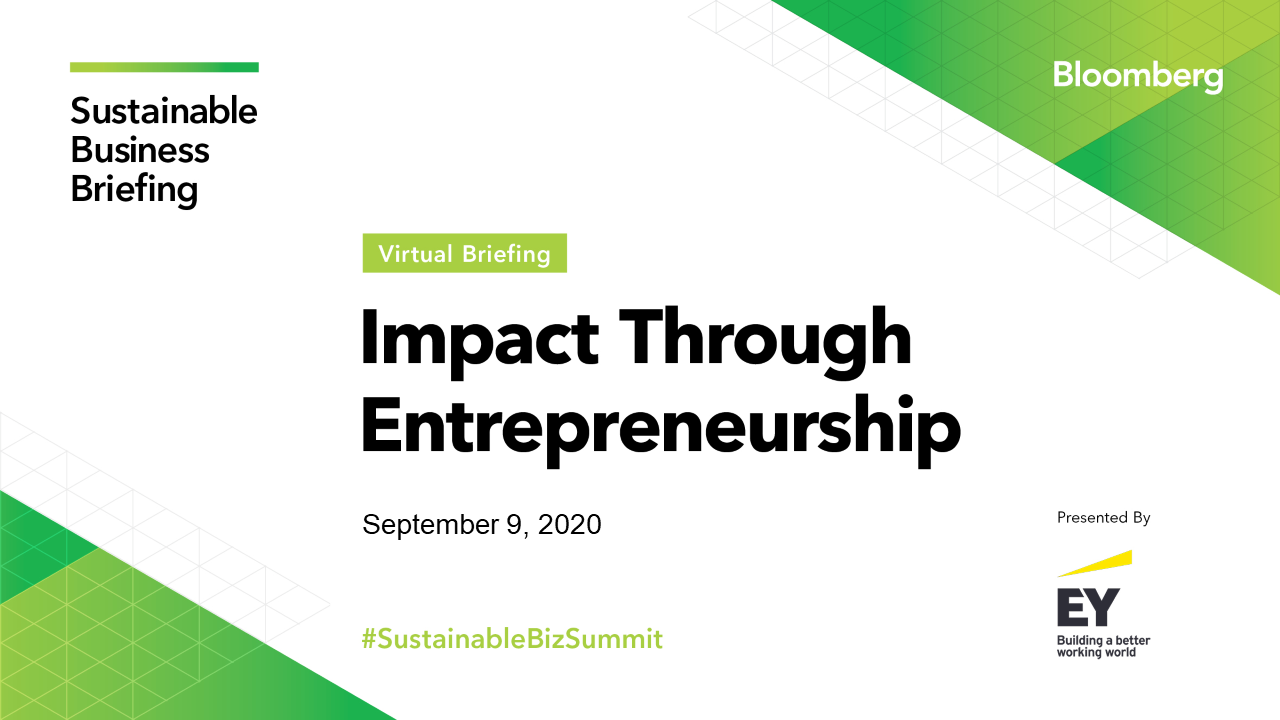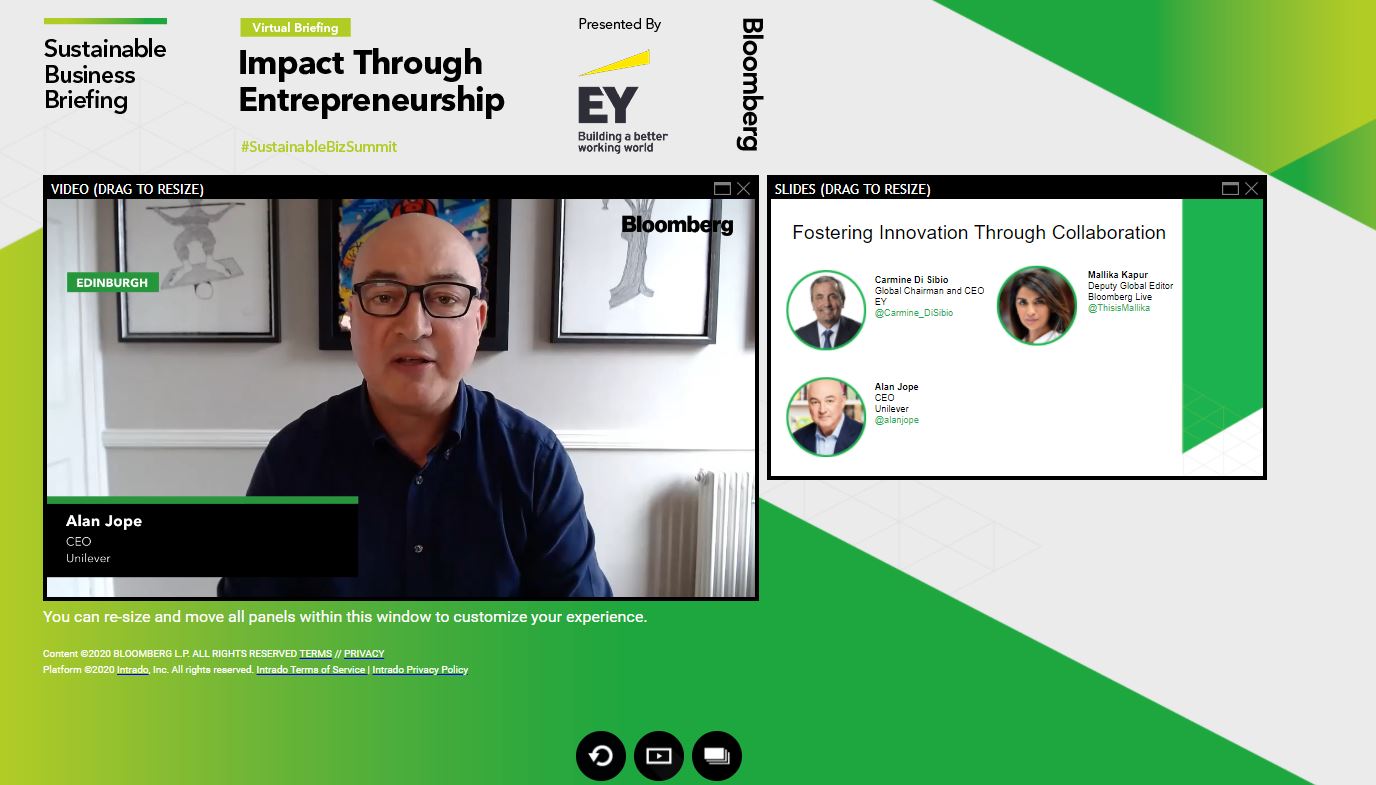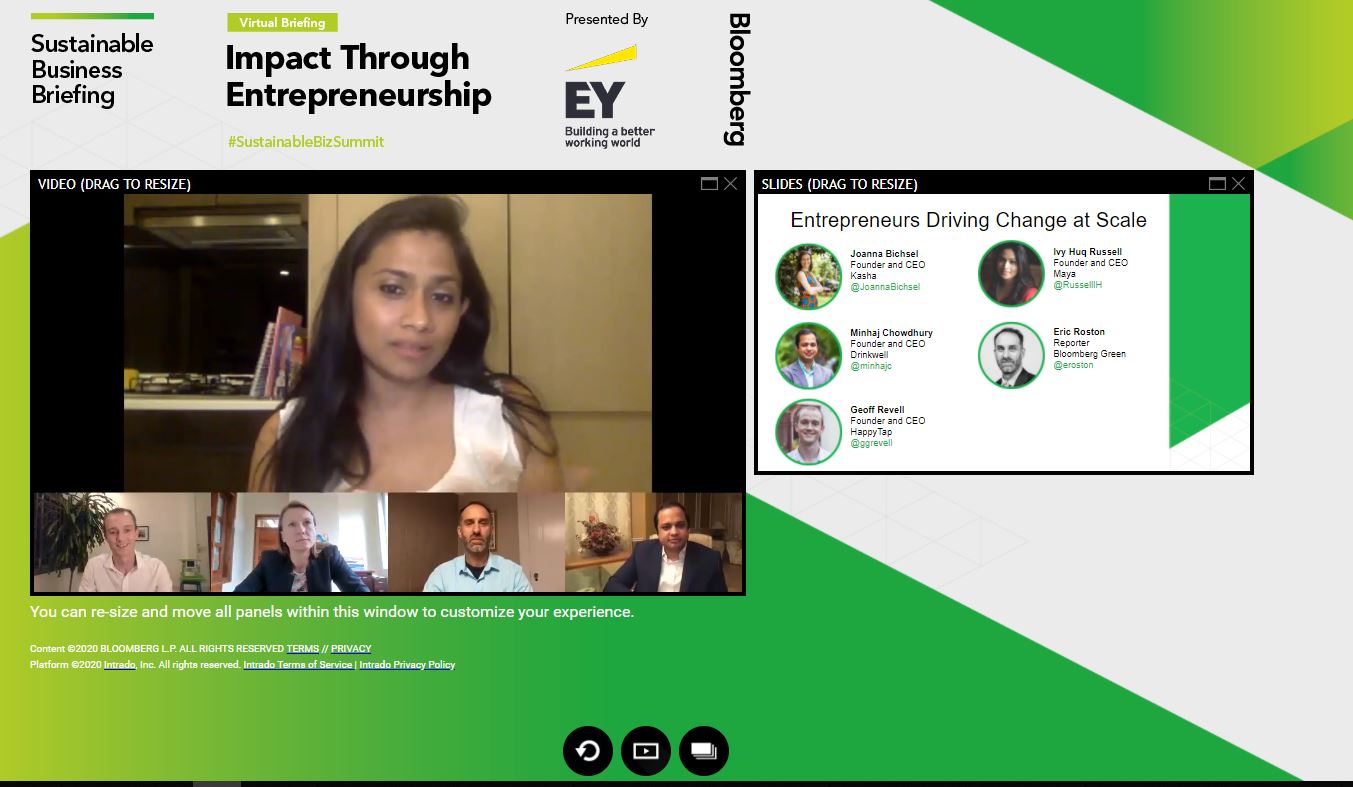By Jenny McCall, Bloomberg Live
At the Bloomberg Sustainable Business Briefing: Impact Through Entrepreneurship September 9 virtual event, the Bloomberg editorial team, led by Mallika Kapur, engaged in a series of conversations with key voices and leaders in the sustainability space. Speakers included:
- Joanna Bichsel, Founder and CEO, Kasha
- Minhaj Chowdhury, Founder and CEO, Drinkwell
- Carmine Di Sibio, Global Chairman and CEO, EY
- Alan Jope, CEO, Unilever
- Geoff Revell, Founder and CEO, HappyTap
- Ivy Huq Russell, Founder and CEO, Maya
- Mallika Kapur, Deputy Global Editor, Bloomberg Live
- Eric Roston, Reporter, Bloomberg Green
Click here to view video of the full discussion.

A few of the key takeaways:
- Carmine Di Sibio, Global Chairman and CEO of EY, sponsor of the briefing, said that there were two examples of companies that he believed were doing well during these unprecedented times and were a good example of growth. One was Biocon, an India-based health care company. They have been providing “blockbuster drugs” to benefit patients. Begun in the 1980s with $500, Biocon is now a billion dollar company. “It’s a great example of a company with a purpose. But one that is well known is Zoom, and Zoom was one of our regional winners a few years ago. It started as a small company and is now doing so well.” He added, “I think if you didn’t have a purpose today, I don’t think many young people would want to work here [EY]. The pandemic has strengthened the purpose.”
- Alan Jope, CEO of Unilever, said that when it comes to achieving the sustainable development goals. all the philanthropic companies have $2 trillion and the U.S. government has $4 trillion for the sustainable goals. Jope believes that the biggest change in the private sector is the goal of working to abandon this trade-off between purpose and profit. “By being responsible to society, this is a pathway to returns.” Jope also believes that consumers are moving toward brands that operate responsibility. Jope added that Unilever’s sustainable brands are half of their portfolio. “What we see is baby boomers and Gen X, who don’t change their behavior around sustainable brands — but millennials will change brands depending on how sustainable it is.” Jope said it’s about building a stronger business for the future.
- Di Sibio said, “Our clients are learning to be agile by being innovative and there is a lot to learn from smaller companies and entrepreneurs.” He reflected on how overnight the world woke up to this idea that having a supply chain in one country is risky due to the pandemic. “We are working with many of our clients to ensure diversity with their supply chain. There is some geopolitical risk, especially with China today, so we have to digitize the supply chain.”

- Jope said the risk of nationalism is always present — and using local producers involves a risk. However, he added that Unilever is delighted to still have a global supply chain and nationalism would have been harmful for the firm. Jope added that global trade has lifted hundreds of millions of people out of poverty, and, if we retreat from global trade, it will have an impact on the economy. “So we reject nationalism, it’s not good for a global supply chain and eradicating poverty.”
- Jope added that Unilever had just announced this week that they would replace 100 percent of the carbon from their cleaning products with natural carbon. “It’s called the carbon rainbow. We think it’s very possible to build new technologies to reform our products to make them more sustainable for the environment and we will do this by 2030.”
- Di Sibio is also developing a more sustainable business. He said that prior to the pandemic EY had spent $1.1 billion dollars in air travel. That went down to $0 during the pandemic. EY does not plan to have its carbon footprint go up to that level again. “We hope to half our original travel carbon footprint and we have committed to being carbon neutral in 2020,” Di Sibio
- When it comes to gender and equality, Di Sibio believes in setting the standard within EY’s own workforce first. “We believe in getting our own house in order for gender equality. In India, which has a different structure versus China, we are setting up women entrepreneurs as micro-distributors. The transformation in their lives of having financial liberation is huge. We also use our brands as a platform to unstereotype the advertising landscape to be more inclusive of gender, race, and those with disabilities.” He added: “Our management board is 40 percent women. We need to make progress when it comes to people of color.”
- Jope said that inequality and climate change are the two key problems the world faces; they will not be solved without a partnership between government, private, and civil society. “So Dove impacts women through partnership, Hellman’s tackles food waste through partnership.”

- Ivy Huq Russell, Founder and CEO of Maya, explained that mobile-based digital providers are the ones who understand a user’s question and connect them with the expert. “After I gave birth, my mum was recovering from her breast cancer and went into depression and I started to realize that, as women, we needed a safe space to ask questions.” Russell realized that there was a gap in the market. She went on to say that the name Maya is a personal one for her, but also has the meaning of compassion. “So every day working, we are compassionate to our users. It embodies that entire meaning of our business.” Russell added that entrepreneurs should always believe in their product — don’t let social constraints and norms stop them. “Make sure that you have the power of technology to make your product scale. So, if you have this, the product will speak for itself.”
- Geoff Revell, Founder and CEO of HappyTap, said that his service makes handwashing with soap and water accessible wherever needed. “Handwashing is so important and it helped with the current crisis and may even help with the next one,” Revell He added that his motivation for starting HappyTap arose out of and was driven by frustration that the world had made very little progress when it came to handwashing. Revell went on to say, “A lot of times I am reminded that what motivates consumers is a host of other things, not just the practical need to wash your hands, but it could be the motivation to have something that is beautiful. HappyTap is a glorified bucket that makes things easy.”
- Joanna Bichsel, Founder and CEO of Kasha, said that she started her business so that people who had a lower income could get the products they need — whether it’s for menstruation or other health care needs. “I started it because I saw that women were not being catered for and as someone from a tech background, I realized that there was nothing stopping us to ensure that women could confidently get the products they needed,” Bichsel She also said how hard it was to start her business, especially in the developing world where you encounter more constraints with technology and the investment structure.
- Minhaj Chowdhury, Founder and CEO of Drinkwell, began his business after frequent trips back to Bangladesh, his family’s country. He saw that basic necessities were hard to come by and one of those was water. “I realized this was down to the technology and a challenge in service delivery that prevented people from having water. So Drinkwell partnered with two of the largest service providers in Bangladesh, as opposed to competing with them, to provide a water ATM,” Chowdhury He also said that the name Drinkwell means different things in each country. He explained that in many rural places a well is what provides water. But in the Western world, it could mean drinking well. So the name helps them to appeal to a global market.
The Bloomberg Sustainable Business Briefing: Impact Through Entrepreneurship was Presented By

——————————
Join the Conversation: #SustainableBizSummit
Instagram: @BloombergLive
LinkedIn: Bloomberg Live
Twitter: @BloombergLive
Interested in more Bloomberg Live virtual events? Sign up here to get alerts.
——————————